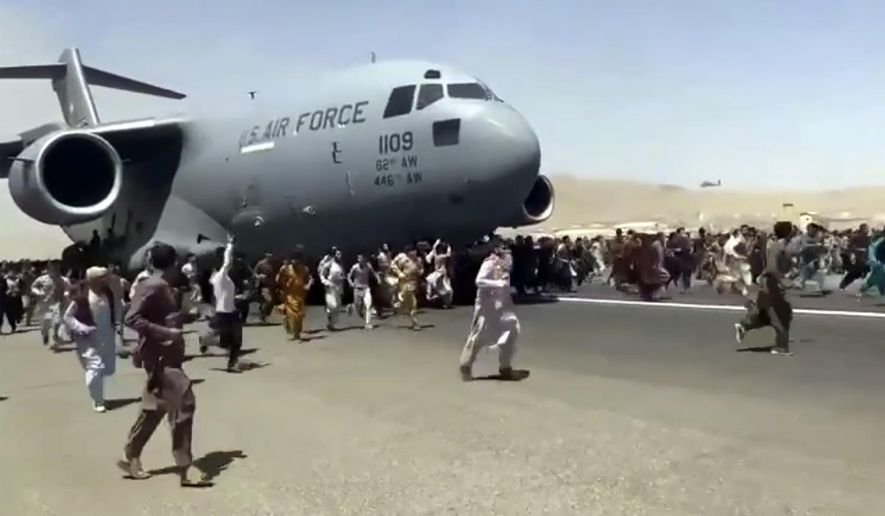Afghan warlord Abdul Rashid Dostum was a key ally of the U.S. Army Special Forces and the Central Intelligence Agency during the 2001 campaign to topple the Taliban following the 9/11 attack on New York City and the Pentagon.
Now he’s gone, having fled his province in northern Afghanistan from Taliban fighters in their successful drive to unite the country under their control. Mr. Dostum isn’t the only former U.S. ally to flee for his life.
Much shorter-term priorities were on the minds of Pentagon leaders Monday, as an estimated 2,500 U.S. troops were trying to fashion some kind of orderly withdrawal at Kabul’s Hamid Karzai International Airport. An image of the interior of a U.S.military C-17 cargo plane, its cavernous bay packed with some 640 Afghan refugees, fleeing Kabul went viral Monday.
With Kabul under Taliban control and U.S. officials focused on trying to get its people and allies out of the country, some analysts say the U.S. military is in a worse position than before if it hopes to ensure that Afghanistan won’t become another safe haven for terror groups such as al Qaeda — as it was the last time the Taliban controlled Kabul back in 2001.
“We had very little intelligence pre-9/11 and we’ll have even less now — other than what you can see with satellites,” said retired Army Lt. Gen. Tom Spoehr, director of the Center for National Defense at The Heritage Foundation.
While satellites are important, they can’t discern intention. That requires a deep network of human intelligence. The Northern Alliance — the part of Afghanistan where the Taliban could never in the past — simply doesn’t exist anymore, Gen. Spoehr said.
“There’s not even a pocket [of Afghanistan] where we could parachute in Special Forces,” he said.
Pentagon officials say the U.S. will continue to maintain a robust “over-the-horizon” counter-terrorism program in the region — even with the prospect of no more American boots on the ground in an unstable Afghanistan.
“We can fly from ships at sea and we can fly from bases in the region. We’ve got the capability and the capacity,” said chief Pentagon spokesman John Kirby. “There’s not a scrap on the earth we can’t hit if we need to.”
The U.S. had been working with other countries in the region to develop the kind of partnerships it needs to maintain the counter-terrorism presence it would require, officials said, but the stunningly swift collapse of the U.S.-backed Kabul government has sent a jolt of urgency into the negotiations.
Without having U.S. troops on the ground, Mr. Kirby acknowledged that it will be more challenging to ensure Afghanistan won’t again become a safe haven for terrorists. The distances will be greater, as will the time needed to carry out a mission.
“But it’s not like we haven’t done this before,” he said. “We believe that our intelligence apparatus and the networks we have in the region now are far more mature than they were in 2001.”
Lt. Gen. Spoehr said he was concerned that China’s burgeoning interest in Afghanistan might be more than merely the search for another trading partner.
“Most people are hoping the relationship with China remains economic and doesn’t become a security relationship,” he said. “There are ways a country like China can help the Taliban secure the communications and better secure their country.”
• Mike Glenn can be reached at mglenn@washingtontimes.com.




Please read our comment policy before commenting.